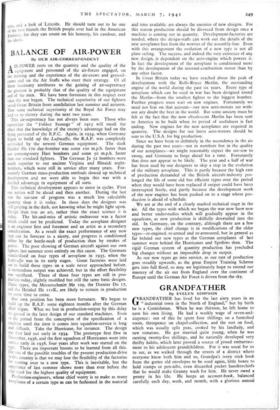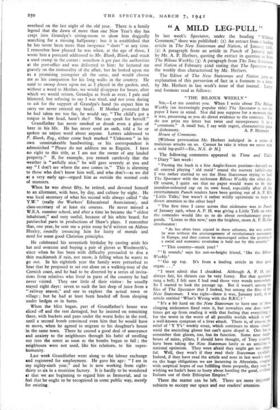GRANDFATHER
By EVELYN SIMPSON
RANDFATHER has lived for the last sixty years in an "industrial town in the North of England," but by birth he is a Cornishman. When he was thirteen, he left home to earn his own living. He had a weekly wage of seven-and- sixpence: out of this he spent four shillings on a furnished room, threepence on chapel-collection, and the rest on food, which was usually split peas, cooked by his landlady, and raw tomatoes. He got married quite young, when he was earning twenty-five shillings, and he naturally developed very thrifty habits, which later proved a source of proud embarrass- ment to his adolescent grandchildren. For it was usual for us to see, as we walked through the streets of a district where everyone knew both him and us, Grandpa's ivory stick hook from the gutter old envelopes to be used again, little boxes to hold stamps or pen-nibs, even discarded pocket handkerchiefs that he would make Granny wash for him. He never owed a penny in his life. He keeps an account-book, balanced carefully each day, week, and month, with a glorious annual overhaul on the last night of the old year. There is a family legend that the dawn of more than one New Year's day has crept into Grandpa's sitting-room to show him doggedly searching for a missing halfpenny: but it is established that he has never been more than twopence " short " at any time. I remember how pleased he was when, at the age of three, I wrote him a postcard addressed to Mr. Blank, Blank, and stuck a used stamp in the corner : somehow it got past the authorities at the post-office and was delivered to him: he lectured me gravely on the immorality of the affair, but he looked upon me as a promising youngster all the same, and would choose me as his companion for his long walks in the country. He used to swoop down upon me as I played in the garden, and, without a word to Mother, we would disappear for hours, after which we would return, Grandpa as fresh as ever, I pale and blistered, but refusing to say I was tired, and not even daring to ask for the support of Grandpa's hand (to expect him to carry me never entered my head). If Mother protested that he had taken me too far, he would say, "The child's got a tongue in her head, hasn't she? She can speak for herself."
Grandfather has never smoked or drunk even a glass of beer in his life. He has never used an oath, told a lie or spoken an unjust word about anyone. Letters addressed to P. Blank, Esq., either come back marked " Unknown " in his own unmistakeable handwriting, or his correspondent is admonished "Please do not address me as Esquire. I have no right to this title, as I am not the owner of any landed property." If, for example, you remark carelessly that the weather is "awfully nice," he will gaze severely at you and say "I don't see where the awe comes in." This is alarming to those who don't know him well, and who don't—as we did at a very early age—regard him as outside the normal code of manners.
When he was about fifty, he retired, and devoted himself to an allotment, with bees, by day, and culture by night. He was local secretary of what his second wife always called "the Y.W." (really the Workers' Educational Association), and class-secretary of at least six courses. He never missed a W.E.A. summer school, and after a time he became the "oldest inhabitant," and very useful, because of his white beard, for patriarchal parts in productions of Shaw's plays. I remember that, one year, he sent me a prize essay he'd written on Aldous Huxley, roundly trouncing him for laxity of morals and need for some good Christian principles.
He celebrated his seventieth birthday by casting aside his hat and overcoat and buying a pair of gloves at Woolworth's, since when he has been with difficulty persuaded to don a thin mackintosh if rain, not snow, is falling when he wants to go out. In his eightieth year the family were perturbed to hear that he proposed to set out alone on a walking-tour of the Cornish coast, and he had to be diverted by a series of invita- tions from relatives who lived in parts of the country he had never visited. They saw little of their visitor: he usually stayed eight days: seven to suck the last drop of juice from a "railway season," and one to explore the actual town or village ; but he had at least been headed off from sleeping under hedges or in barns.
When the blitz began, part of Grandfather's house was sliced off and the rest damaged, but he insisted on remaining there, with buckets and pans under the worst holes in the roof, until a second bomb convinced even him that he would have to move, when he agreed to migrate to his daughter's house in the same town. There he caused a good deal of annoyance and anxiety to the neighbours through his habit of strolling out into the street as soon as the bombs began to fall ; the neighbours were not used, like his relations, to his super- humanity.
Last week Grandfather went along to the labour exchange and registered for employment. He gave his age: "I am in my eighty-sixth year," and he is now working from eight- thirty to six in a munition factory. It is hardly to be wondered at that we are beginning to regard him as Immortal, and to feel that he ought to be recognised in some public way, merely for existing.































 Previous page
Previous page